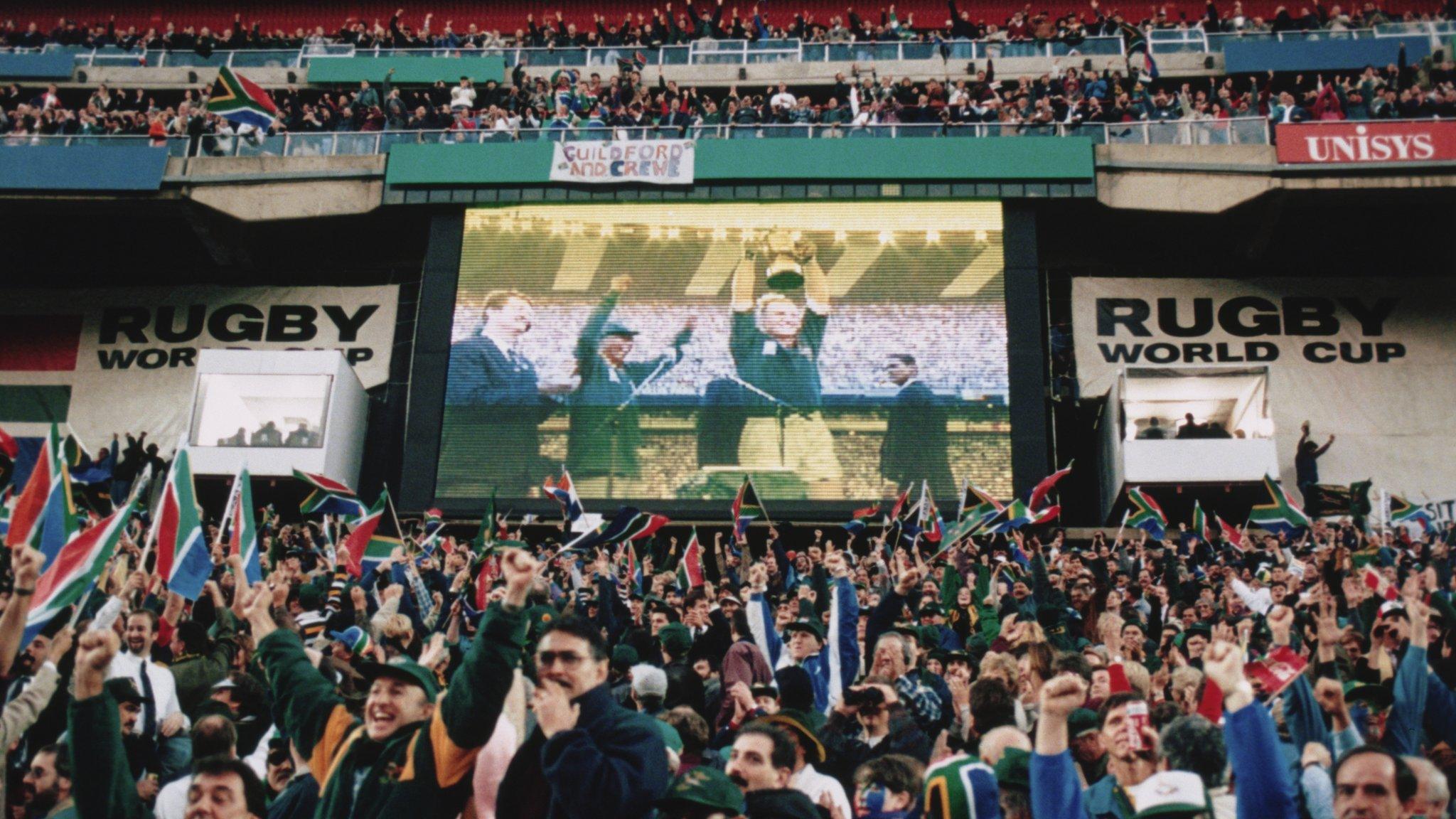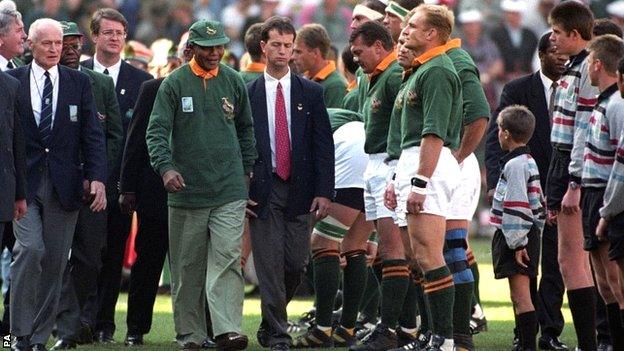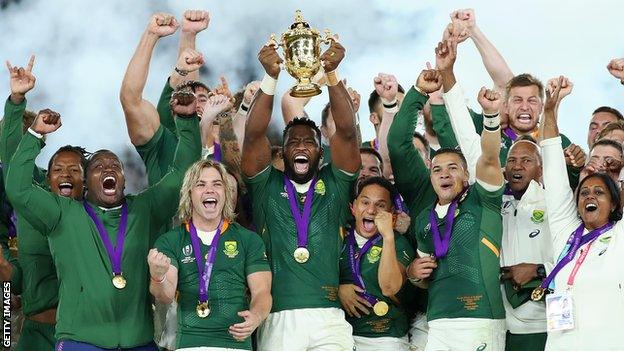Rugby World Cup 2023: South Africa's 1995 captain Francois Pienaar 'the luckiest player ever'
- Published

South Africa's 1995 Rugby World Cup success is one of sport's most celebrated triumphs
Former South Africa captain Francois Pienaar considers himself "probably the luckiest player ever" given what his team's Rugby World Cup triumph in 1995 meant to the nation.
Pienaar famously lifted the trophy alongside former South Africa president Nelson Mandela after the Springboks beat New Zealand 15-12 on home soil at Johannesburg's Ellis Park.
Nearly three decades on, Pienaar says he has no hope of ever forgetting the success - even in the unlikely event he ever wanted to.
"It's impossible to describe how important that victory was to everybody in South Africa - and 28 years later, I'm reminded of it on a weekly basis," Pienaar, now 56, told BBC Sport Africa.
"When I travel through South Africa, people tell me where they were and what emotions they felt. I hear stories from people in townships who [say they] didn't like rugby, had stood against it but then started following the game.
"I'm probably the luckiest player ever given what I've experienced through people that never had the opportunity to play the game."
Even before the tournament kicked off, the World Cup was of huge significance to South Africa. It was a chance to put on such a spectacle for the first time since apartheid ended, and to banish South Africa's accompanying status as a global pariah.
It was only in 1989 that public facilities - previously separated on racial grounds - were desegregated, in 1990 that Mandela was released after 27 years in prison, and in 1991 that the final apartheid laws were repealed.
As the World Cup approached, most of South Africa was still giddy with emotion after the African National Congress (ANC) - which had been banned until 1990 - had taken power in South Africa's first non-racial elections in 1994.
"We didn't have a clue what that victory was going to do for the country and I'm glad we didn't, because it might have worked against us," said Pienaar of the outpouring of emotion that followed the final.
"Winning the World Cup and being the fortunate captain was life-changing."
Dreams of 1995 'not fulfilled'
Images of South African president Nelson Mandela presenting Francois Pienaar with the Rugby World Cup trophy in 1995 have become iconic
South Africa have won three World Cups, but the 1995 success has been particularly feted, even inspiring a Hollywood film - Invictus - in 2009.
Despite the sky-high hopes of how it would transform the so-called Rainbow Nation, Pienaar feels the political dreams have not materialised.
Suffering the world's highest unemployment rate of 42%, South Africa's key infrastructure systems - such as water, rail and electricity - are currently in dire straits.
As the BBC's former South Africa reporter Andrew Harding wrote as he ended a 15-year posting in Johannesburg, the country - "a frighteningly violent nation, now also warped by corruption and plagued by hunger" - is officially the world's most unequal.
Last year, a mammoth inquiry - known as the Zondo commission - into the 2009-2018 presidency of Jacob Zuma detailed the looting of billions of dollars from South Africa's state coffers by ANC leaders.
"I'm disappointed with the state of South Africa at the moment - the hope has not been fulfilled for many people," Pienaar admitted.
"It's really the poor and the vulnerable that are suffering. Are they getting better opportunities to find jobs? And unemployment in South Africa is really high.
"We're battling with load-shedding [scheduled electricity cuts], we've just gone through the Zondo commission which unearthed the most incredible corruption - you just can't make it up - so to fix that is going to take some time."
Mandela gesture 'could have backfired'

Nelson Mandela meets the South Africa team at the 1995 World Cup final, wearing his Springbok jersey
Unlike the upcoming matches at this year's World Cup, which France hosts from 8 September to 28 October, players were unable to warm up on the field prior to kick-off in 1995.
As a result, Pienaar recalls a highly combustible atmosphere as his squad - upon whom so much sporting and political pressure was heaped - counted down the minutes.
"That dressing room was so tense and everybody was so nervous," he recalled.
"There was a knock on the door and in walked Mr Mandela wearing a Springbok jersey. He wished us luck and when he turned around I saw my number, '6', on his back - that was just incredibly emotional.
"It could have backfired because we were so tense. As captain, my role was to keep everybody calm and focused on what we were there to do."
Pienaar certainly did that and when the referee blew the final whistle, after Joel Stransky had flighted a drop goal through the posts seven minutes earlier, the skipper sank to his knees "overcome with emotion".
South Africa's 2023 hopes

After the 1995 and 2007 wins, Siya Kolisi became - in 2019 - the first black South African captain to lift the World Cup
One area where Pienaar has seen real growth in South Africa is in its rugby, with the Springboks - who had just one black player, the late Chester Williams, in their 1995 squad - winning the 2019 title with a more multiracial team.
Led by Siya Kolisi, the first black Springboks captain, the winners' two tries in 2019 were also scored by black players, Makazole Mapimpi and Cheslin Kolbe.
Calling Kolisi a "really nice human being" with "such a big heart", Pienaar believes the captain has transformed the sport in terms of making it more appealing and accessible to South Africa's next generation.
"What Siya did for the country in 2019 was so important in terms of growing the game everywhere. In 1995, you would argue that four-five million people loved rugby - now 60 million do," Pienaar said.
"There are so many more opportunities for players to play and if you look at our team, it really is a rainbow nation and a reflection of modern South Africa."
Despite the team missing key World Cup winners - fly-half Handre Pollard and centre Lukhanyo Am - through injury, and Kolisi only recently returning after a bad knee injury, Pienaar is upbeat about the team's chances.
"There are a lot of players in the squad who tasted history four years ago and we have a chance," he said.
France kick off the tournament against perennial hopefuls New Zealand on Friday, with the world's top-ranked side, Ireland, also seen by many as possible champions alongside hosts France and South Africa, who open against Scotland on Sunday.
"The top five-six teams in the world definitely all have hopes, but this World Cup is fascinating as no-one can call it."